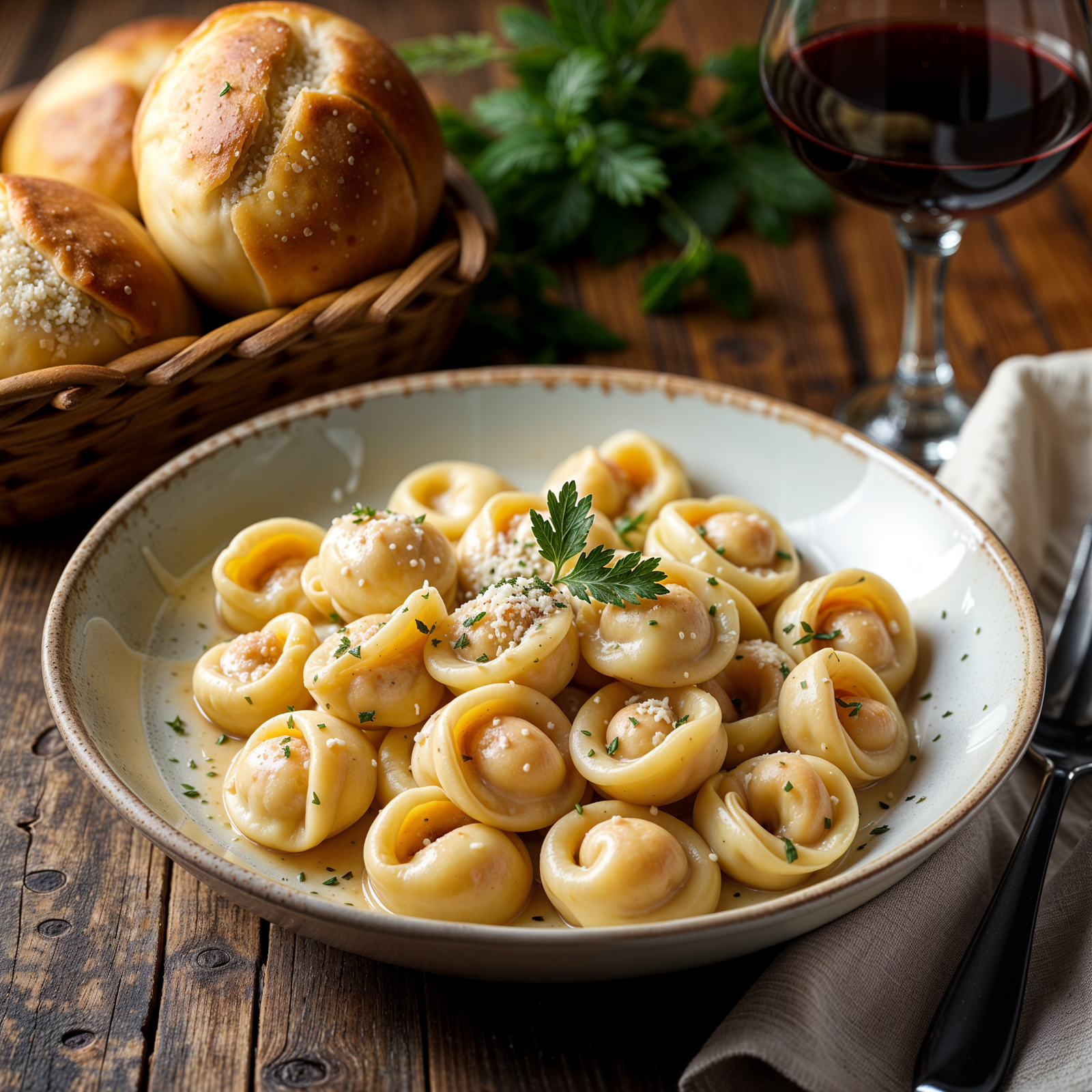Tortellini have a special charm. They are a key part of Italy’s food culture. This cheese-filled pasta is a symbol of Italy’s rich culinary history. It’s perfect when served in a warm broth or with a smooth sauce.
Tortellini are known for their unique ring shape and versatility. They can hold fillings like rich cheeses or traditional meat mixtures. These fillings capture the essence of Italian cuisine. Cooking them is quick, taking only 10 to 11 minutes.
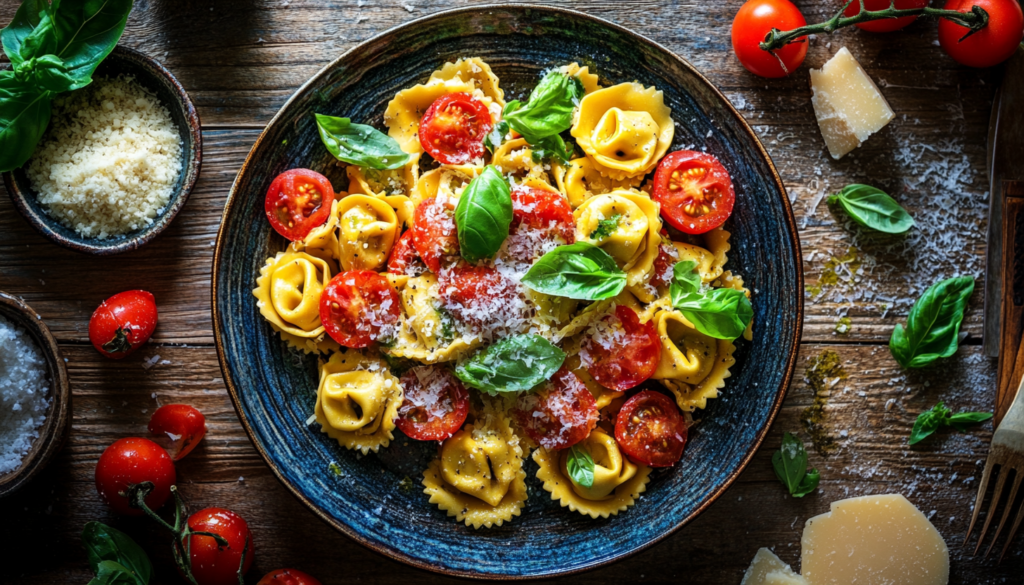
Emilia Romagna is where tortellini originated. It’s a place that cherishes this pasta. They often serve it in hearty broths made with beef, chicken, or vegetables. These broths have been perfected over generations.
The traditional broths are full of flavor. They use beef chuck, veal shank, fresh veggies, and herbs. Pellegrino Artusi included almost 800 recipes in his book, showing how important tortellini are in Italian cooking.
Key Takeaways
- Tortellini are a precious gem in the crown of Italian cuisine, especially in the Emilia Romagna region.
- Barilla Three Cheese Tortellini offers a harmonious cheese blend that tantalizes with every morsel.
- Ideally cooked within 10 to 11 minutes, tortellini serve as a quick yet sophisticated meal.
- Meticulously crafted broths beautifully complement the stuffed pasta, enhancing its flavor profile.
- From Massimo Bottura’s contemporary creations to historical concoctions, tortellini recipes continue to evolve, enriching Italian gastronomy.
- Chef Evio Battelani’s innovative recipes from the 1960s remind us of the adaptability and timeless appeal of tortellini.
The Origins and Cultural Significance of Tortellini
Exploring the origins of tortellini takes me to Castelfranco Emilia, a town between Modena and Bologna. This stuffed pasta has a fascinating story, starting with an innkeeper’s creative idea inspired by Venus, the goddess of love. The shape of tortellini was said to mimic her navel, adding a touch of the divine to this beloved dish.
First mentioned in 1112, tortellini has a long history, becoming a key part of Italian cuisine, especially in Bologna. Making tortellini was not just a cooking task but a way to keep traditions alive. It used leftover ingredients, showing Italian creativity.
Tortellini are served in a savory broth and filled with a mix of ingredients like Parmesan or ricotta cheese, prosciutto, and pork. These fillings create a taste that captures the heart of Italian food.
The making of tortellini requires not only knowledge but also years of experience, as the techniques passed down through generations are intricate and detailed. It’s a true art form in Italian cuisine.
In Modena, the filling is special, with minced pork, mortadella, and other ingredients. Each bite is a taste of the region’s history and culture.
Whether in broth or with a rich ragù, tortellini tells stories of local tastes and culinary changes. In Bologna, it’s often served with a unique ragù, including pork sausage and dried mushrooms.
Thinking about tortellini’s history and cultural importance makes us value this pasta more. It’s not just about the taste but also about honoring a long culinary tradition. This tradition lives on in pasta dishes worldwide.
A Tour of Italy’s Stuffed Pasta Varieties
My journey through Italy shows a wide variety of stuffed pasta, each with its own twist. From the classic Emilian tortellini to the unique shapes of Lombardy’s casonsei, the diversity is amazing. It’s not just tasty but also full of history.
Emilia-Romagna’s Classic Tortellini
In Emilia-Romagna, tortellini are a big deal. They are filled with a mix of pork loin, prosciutto, Parmesan cheese, and eggs, seasoned with nutmeg. These small pasta shapes are a big part of Christmas and Easter celebrations. They’re more than just food; they symbolize family and joy.
Piedmont’s Agnolotti and Ravioli del Plin
In Piedmont, I found agnolotti and ravioli del plin. Agnolotti are square and filled with braised meats and rich local wines. Ravioli del plin has the same fillings but is pinched together, giving a fun texture. Some versions even use brains and donkey meat, showing the area’s unique tastes.
The Unique Shapes and Flavors of Lombardy’s Casonsei
Lombardy has its own stuffed pasta, casonsei. They look like candies and are filled with meat, cheese, pears, and biscotti. Each region in Lombardy has its own take on this dish, making it exciting for food lovers.
- Ravioli scapolese from Basilicata, filled with dried sausage, scamorza cheese, and fennel.
- Culurgiones from Sardinia, a simple filling of potatoes and pecorino, sometimes with mint.
- Pansotti from Liguria, a vegetarian option with local cheeses and herbs.
As I keep exploring, I see how each region values and innovates their stuffed pasta. It’s not just about the food; it’s about the stories, history, and creativity behind it. This journey shows the beauty of Italian stuffed pasta, proving it’s an art worth enjoying.
Discovering the Filling: Inside Italy’s Beloved Tortellini
When you think of Italian food, you might picture the delicate twist of tortellini. It’s not just the pasta that’s special, but the rich, savory tortellini filling. This filling is a key part of Italy’s culinary artistry. Let’s explore what makes meat tortellini more than just food.
The secret of meat tortellini is its filling. It’s a mix of finely chopped pork loin, Mortadella di Bologna, and a touch of nutmeg. All these are blended with the creamy taste of Parmigiano Reggiano cheese. This mix is a key part of Emilia-Romagna’s culinary tradition. It shows how place and culture shape our favorite flavors.
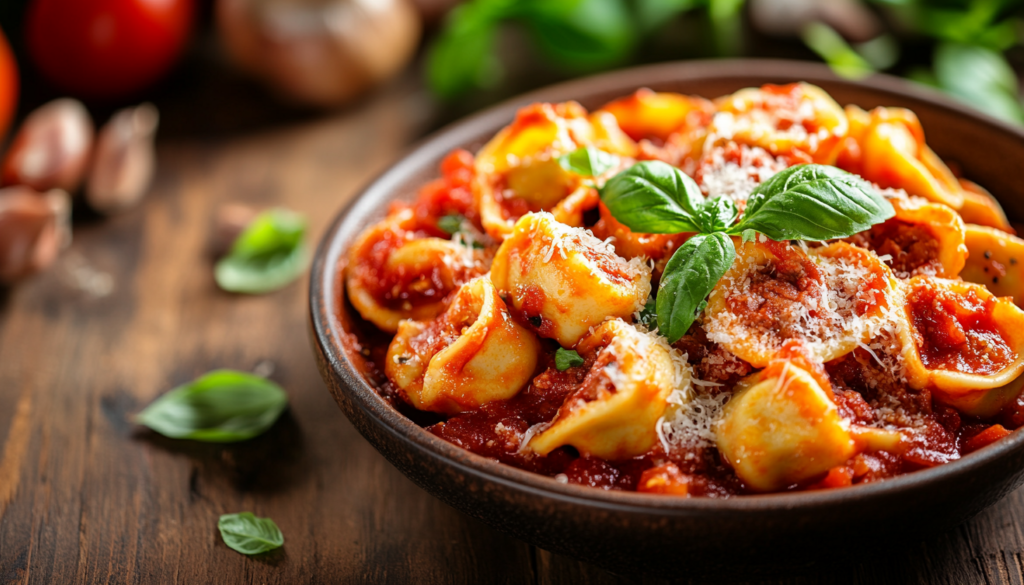
| Ingredient | Description | Origin |
|---|---|---|
| Pork loin | Finely ground, it brings a tender texture. | Locally sourced from Italian farms. |
| Mortadella di Bologna | A rich Italian sausage that adds depth. | Specifically from Bologna, enhancing authenticity. |
| Parmigiano Reggiano cheese | Aged cheese, lends a nutty, creamy texture. | Produced in areas of Parma and Reggio Emilia. |
Learning about the meat tortellini filling connects us with Italy’s food traditions. It also offers flavors that everyone loves. As the ingredients mix, Mortadella di Bologna adds a meaty touch. Parmigiano Reggiano cheese brings a creamy comfort. It’s more than a meal; it’s a trip through Italy’s heart, with each bite of tortellini filling.
So, as you enjoy each tortellino, remember you’re tasting centuries of craftsmanship and regional pride. You’re also hearing the stories of Emilia in one of Italy’s most beloved dishes.
The Art of Making Tortellini: A Step-by-Step Guide
Starting to make tortellini turns your kitchen into a place of Italian pasta art. It’s a craft passed down through generations. Each tortellini becomes a piece of edible art.
Preparing the Perfect Dough
For those who love cooking, making tortellini starts with the right pasta dough. Choose top-quality flour for the best results. Mix it with eggs slowly until the dough feels smooth and elastic.
Kneading is key; the more you do it, the better the pasta will shape. Let the dough rest, covered, to develop gluten. This makes the pasta chewy.
The Secrets to a Savory Filling
The filling of tortellini is what makes it special. It’s a mix of ground turkey, beef, pork, with prosciutto and mortadella. Add Parmesan cheese and a bit of nutmeg for flavor.
Blend these ingredients in a food processor until smooth. This mix of meats and spices makes each tortellini full of taste.
Mastering the Classic Tortellini Shape
Getting the right shape for tortellini takes care and patience. Roll out the dough thinly, cut into squares, and put some filling in the middle of each. Fold into a triangle, press out air, and seal with egg.
Then, bring the triangle’s points together to form the classic navel shape. This keeps the filling inside while cooking.
Serve your tortellini in broth or with a rich sauce. Each piece you make shows off the art of Italian pasta. Making tortellini is rewarding, thanks to the traditional flavors it brings.
The Best Tortellini Fillings and Their Regional Twists
Tortellini is a special part of Italian pasta, loved for its variety and regional flavors. Traditional fillings like cheese filling and meat filling have grown to include new tastes. Now, we have ricotta tortellini and spinach tortellini. Each region in Italy adds its own twist, making tortellini a must-try dish.
In Northern Italy, especially in Emilia-Romagna and Lombardy, you’ll find ricotta tortellini. They’re filled with ricotta and spinach, using local dairy and greens. This spinach filling is not just tasty but also healthy. On the other hand, Piedmont loves a hearty meat filling, using local meats in their agnolotti.
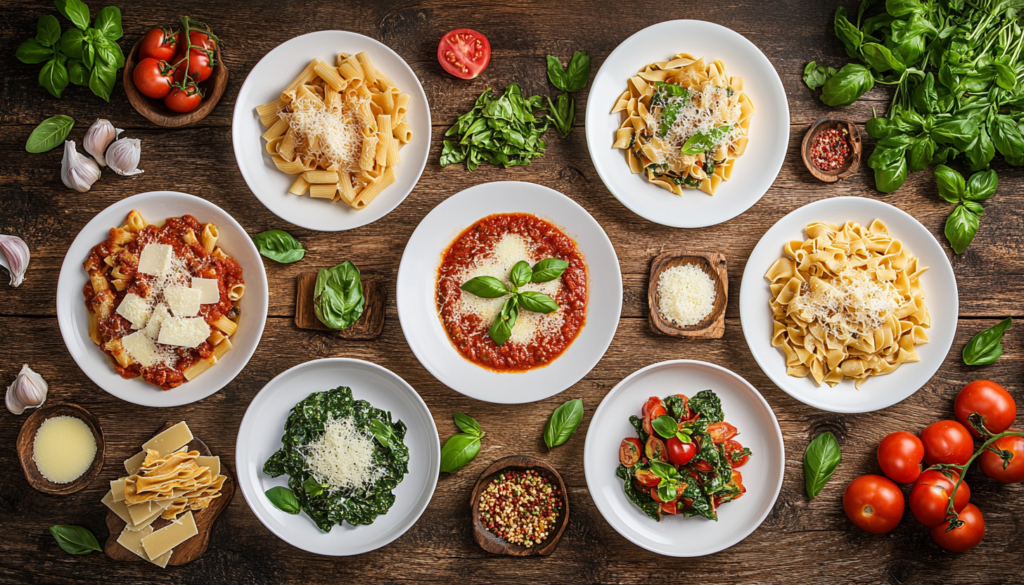
- Tortellini with Parmesan, egg, and prosciutto reveals the classic taste of Bologna.
- Spinach tortellini, blending ricotta with fresh spinach, offers a vegetarian delight that is both tasty and hearty.
- Meat-filled cappelletti, commonly enjoyed in Emilia-Romagna during Christmas, showcases the festive culinary tradition of the region.
Making these fillings is an art. Whether it’s quickly mixing spinach and ricotta for a veggie meal or slow-cooking meats for agnolotti, it’s a craft.
| Pasta Type | Common Fillings | Region | Cooking Time |
|---|---|---|---|
| Tortellini | Parmesan, prosciutto | Emilia-Romagna | 5 min |
| Tortelloni | Ricotta, spinach | Lombardy | 6 min |
| Agnolotti | Roasted meats, cheese | Piedmont | 7 min |
| Cappelletti | Ricotta, Parmesan Reggiano | Emilia-Romagna | 5 min |
| Fagottini | Truffle, pear | Lombardy | 10 min |
| Conchiglie | Ricotta, cottage cheese, and spinach | General | Varies |
Exploring tortellini and its types is like a food tour of Italy. Each bite takes you through the region’s culinary heart. It’s a celebration of flavors and traditions.
Traditional vs. Modern: The Evolution of Tortellini Dishes
Exploring tortellini recipes shows how these pasta pockets have changed from simple dishes to modern ones. They have moved from traditional to innovative pasta dishes. This change shows the blend of tradition and innovation in Italian cooking.
Classic Broth-Based Tortellini
Traditional tortellini cooked in a savory broth is a classic Italian dish. It brings out the pasta’s filling flavors, like meat or cheese and herbs. This dish was once served on special occasions in medieval times. Now, it’s still loved by Italian families during festivals and holidays.
Creative Contemporary Tortellini Recipes
Modern tortellini dishes are bold and creative. Chefs use fillings like truffles or seafood and sauces like saffron cream or tangy tomato vinaigrettes. This keeps the pasta’s history alive while appealing to today’s tastes.
Massimo Bottura’s dish, tortellini with Parmigiano cream, is a great example. It combines traditional and modern cooking styles.
| Feature | Traditional Tortellini Dish | Modern Tortellini Creation |
|---|---|---|
| Base Ingredient | Pork, prosciutto, Parmigiano Reggiano | Truffles, lobster, artisan cheeses |
| Typical Sauce | Broth-based | Parmigiano cream, saffron infusion |
| Serving Occasion | Holidays, family gatherings | Culinary events, high-end dining |
| Culinary Focus | Traditional flavors | Innovative, experimental flavors |
The shift from traditional tortellini to modern dishes shows a trend in Italian cooking. It’s a mix of innovation and tradition. Both traditional and modern cooks add to the story of tortellini, making it a timeless dish.
Tortellini: Pairing with Sauces and Broths
When I think about perfect tortellini pairings, I often think of meat broth and Italian sauces. These elements turn a simple meal into a feast of flavors. The right sauce or broth can make a dish special, lifting it to a new level.
A creamy tomato sauce is great with both fresh and frozen tortellini. It’s easy to make and blends well with the pasta and its filling. Find a creamy tortellini sauce that adds Asiago and Parmesan cheese richness.
Let’s look at some tortellini serving ideas. Pasta sauces like butter and sage or Bolognese are perfect. For a taste of Italy, try a simmering meat broth. Here’s a guide to matching sauces with different fillings:
| Tortellini Filling | Sauce/Broth Pairing | Preparation & Cooking Time |
|---|---|---|
| Cheese & Spinach | Creamy Tomato Sauce | 15 minutes |
| Meat | Rich Meat Broth | 25 minutes (Slow simmer) |
| Mushroom | Butter & Sage | 10 minutes |
Exploring tortellini pairings, remember that you can cook tortellini from frozen. This saves time without losing flavor. It’s great with pasta sauces like the creamy tomato sauce. This sauce is creamy, rich, and quick to make.
Looking into Italian sauces and broths, the secret to great tortellini servings is finding the right balance. The sauce should match the pasta’s filling, making each bite a joy.
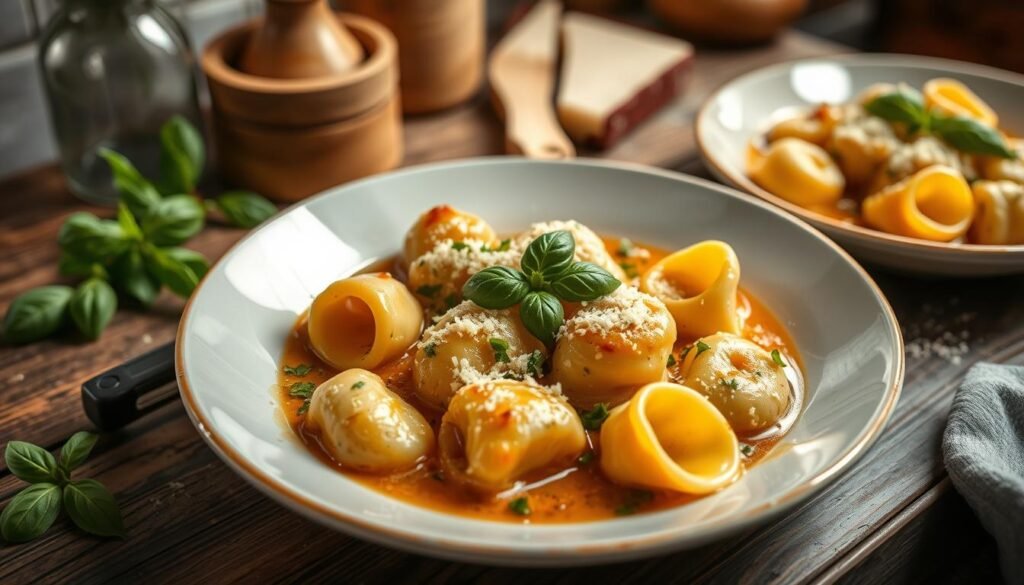
Tortellini in Italian Cuisine: Dining Etiquette and Traditions
Tortellini traditions are a big part of Italian dining etiquette, especially during special occasions. Each bite of tortellini tells a story of history and culture. It’s more than just food; it’s a key part of celebrations like Christmas and Easter.
Special Occasions and Tortellini
Tortellini is more than just a dish; it’s a symbol of celebration. During holidays, Italian families come together to enjoy it, often in a broth. This tradition is about family, heritage, and keeping traditions alive.
Regional Preferences for Serving Tortellini
Every region in Italy has its own way of serving tortellini. From Bologna’s savory broths to creamy sauces elsewhere, tortellini is versatile. But the core of its flavor—meats, cheese, and nutmeg—remains the same across the country.
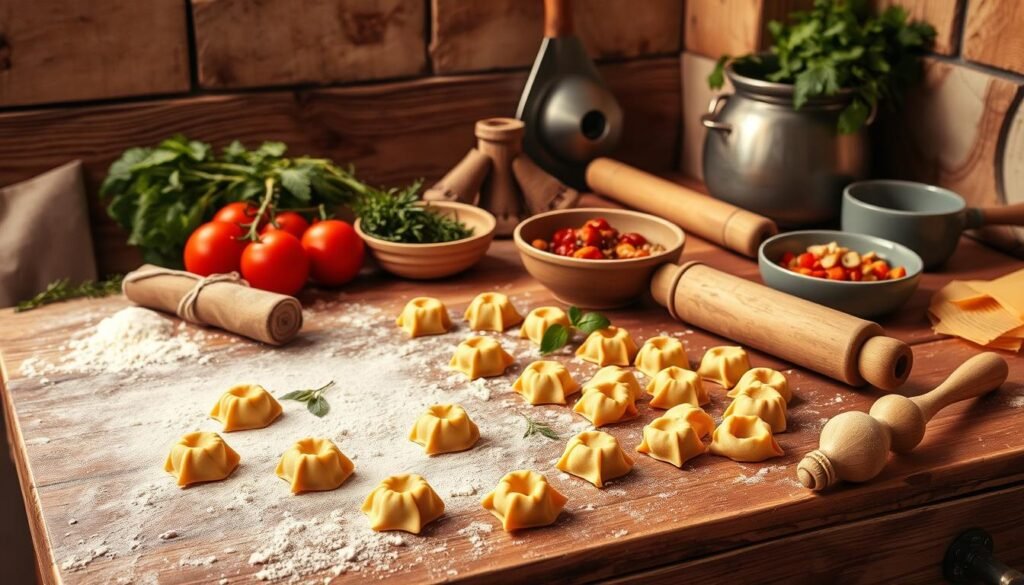
| Parameter | Statistical Data |
|---|---|
| Occurrences in Italian dining establishments | High frequency in both casual and fine dining |
| Traditional recipes featuring tortellini | Around 75% of regional recipes |
| Regional consumption variations | Differ significantly from North to South |
| Average portion size in restaurants | Typically one substantial bowl per person |
| Sales volume in grocery stores | Accounts for 30% of pasta sales |
| Weekly inclusion in household meals | 50% of households serve tortellini weekly |
| Popularity in dining settings | More popular in fine dining than casual eateries |
| Economic impact on local communities | Significant, particularly in Emilia-Romagna |
In conclusion, tortellini is more than just food; it’s a key part of Italian culture and family gatherings. Whether it’s in a savory broth or with wine, tortellini is a beloved dish. It’s especially valued during special occasions and in the different ways it’s prepared across regions.
Expanding Horizons: Tortellini Goes International
As a professional copywriting journalist, I’ve seen how tortellini international has become a big deal. It shows the power of global Italian cuisine. Tortellini’s rich flavors and adaptability have made it a hit in many cultures.
It’s amazing to see how tortellini went from Italian streets to dinner plates around the world. This versatile pasta has brought people together with every bite. It’s more than food; it’s a story of heritage and change.
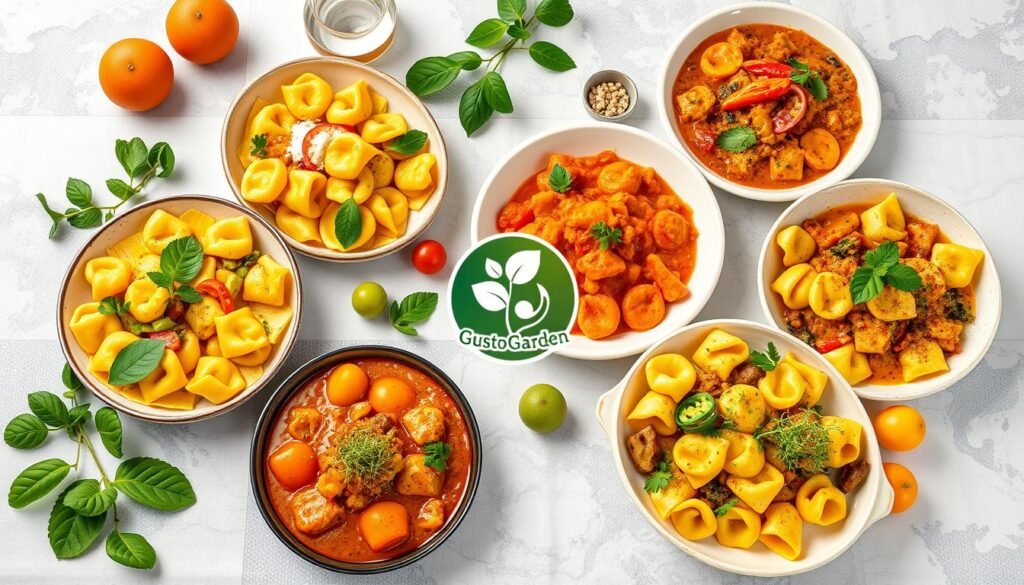
Pasta dishes worldwide have changed a lot, taking on local tastes. But tortellini has kept its true self. Chefs in New York and cooks in Tokyo add their own twist to tortellini, keeping its Italian roots alive.
Education has played a big role in making tortellini a global dish. I saw this during a 16-day study program in Italy. Students learned about traditional and modern food, making tortellini in a local kitchen. It was like watching history come alive.
| Nutritional Information | Preparation Details | Academic Insights |
|---|---|---|
| Calories: 217 Total Fat: 9.7g Cholesterol: 29.8mg Sodium: 650mg Potassium: 450mg Protein: 11.5g | Best Season: Winter Prep Time: 15 mins Cook Time: 25 mins Total Time: 40 mins Recipe Keys: quick-meals, Pork, Soups | Courses taught by Chef Mary G. Trometter Assisted by Lauren A. Rhodes Focus: Global Food & Hospitality Next Offering: Spring 2024 |
The story of tortellini international shows how it moved from simple beginnings to a global favorite. It’s a journey that’s changing traditional food ideas. It’s introducing the world to the endless possibilities of Italian cuisine with a global twist.
Cooking with Tortellini: Tips from Italian Chefs
Exploring the world of authentic Italian pasta, like tortellini, is exciting and requires care. Italian chefs share key cooking tips. They stress the importance of using fresh ingredients and finding the right flavor balance. Let’s see how these tips turn simple meals into unforgettable ones.
The Importance of Fresh Ingredients
Italian chefs stress the need for fresh ingredients in authentic Italian pasta. Freshness in cheeses and veggies boosts flavors and adds richness to dishes like tortellini. For example, Olivieri® offers fresh tortellini types like 3 Cheese Rainbow and 7 Cheese Rainbow. These show how top-quality ingredients can elevate a dish.
The Balance of Flavors in Tortellini Dishes
Mastering tortellini means getting the flavor balance right. Chefs suggest a mix of spices, cheeses, and broths for a rich yet refined taste. A balanced sauce, with butter, garlic, and basil, enhances the tortellini without overwhelming it. Aim for a taste that respects the ingredients’ true nature.
Following cooking tips from Italian chefs can elevate your tortellini. It’s key to cook the pasta right, whether it’s fresh, frozen, or dried. For instance, fresh Olivieri® Tortellini cooks in about 6 minutes, keeping its great texture and taste. The goal is to let each ingredient shine, creating a dish where flavors blend beautifully.
Italian Stuffed Pasta in the Market: From Retail to Restaurants
The Italian stuffed pasta market is growing fast, especially in retail and restaurants. Food distributors and those in the foodservice industry see big chances for success. They can offer a wide range of Italian stuffed pasta, each with its own taste and story.
Italian regions bring their own unique flavors to stuffed pasta. For example, Piedmont offers hearty agnolotti filled with meat. Tuscany has nutmeg-flavored potato tortelli. These dishes add to the variety of commercial pasta and make dining experiences more special.
Businesses gain a lot from offering stuffed pasta. They can sell different types, like classic tortellini or unique culurgiònes from Sardinia. This variety helps them charge more and make bigger profits. Plus, making stuffed pasta is easy yet impressive, drawing in more customers.
Noodles & Company shows how to adapt in the foodservice industry. They’ve added new filled pasta dishes in places like Chicago and Columbus. Their rewards program, Extra Goodness, gives customers daily rewards. This keeps customers coming back for more.
Italian stuffed pasta is becoming more popular. This is a big chance for food distributors and food service operators. By offering new and authentic Italian dishes, they can stand out in the competitive food market.
Tortellini: A Culinary Symbol of Emilia-Romagna
Emilia-Romagna is famous for its big role in Italian regional cuisine. It’s especially loved for its tortellini. This small pasta is more than just food; it tells a story of tradition and history. It’s a key culinary symbol of Italy.
The story of tortellini history shows how each piece is filled with centuries of skill. From Bologna’s busy streets to Modena’s festive scenes, tortellini is a big part of Emilia-Romagna’s culture.
The Historical Roots of Tortellini in the Region
The story of tortellini is as tasty as its filling. It’s said to be named after Venus’s navel, adding a touch of myth to its tale. In Emilia-Romagna, making tortellini is a tradition that goes back generations. It shows the region’s love for its food heritage.
Emilia-Romagna’s Influence on Tortellini Popularity
Emilia-Romagna has a big impact on tortellini’s fame. With famous foods like Parmigiano-Reggiano and prosciutto di Parma, the region knows how to mix simple, top-quality ingredients into complex flavors. This skill makes tortellini a favorite in Italy and around the world.
| Comparison | Tortellini | Tortelloni |
|---|---|---|
| Size | 2g | 5g |
| Filling | Meat-based | Ricotta, parsley or spinach |
| Cooking Method | Typically in broth | Boiled in water, served dry |
The table shows how tortellini and tortelloni are different. It points out the variety in Italian pasta, thanks to local tastes and traditions. Emilia-Romagna’s focus on quality makes tortellini more than just a meal; it’s a way to celebrate Italian culture.
Nutritional Facts and Health Benefits of Tortellini
Exploring Italian cuisine, we find the delightful tortellini. It’s not just tasty but also good for our health. A 100-gram serving has 7-9 grams of protein, important for muscles and growth. This makes it a key part of a healthy diet.
Tortellini is often in rich dishes but it’s also good for us. It gives us carbohydrates, our main energy source. Depending on the filling, it can also have fiber and calcium. These are good for your digestive health and bones.
The calories in tortellini range from 200 to 250 per 100 grams. It’s low in fat and has B vitamins like thiamine, riboflavin, and niacin. These vitamins help turn food into energy and keep our skin healthy and our brains working well.
- Tortellini has iron, magnesium, and zinc. These minerals help our immune system, bones, and metabolism.
- There are low-sodium tortellini options that are just as tasty. This shows it can fit into different diets.
- There are gluten-free and vegetarian tortellini for everyone to enjoy.
Adding tortellini to your meals can boost your energy, improve digestion, and increase mineral intake. This makes it a key part of a balanced diet. You can enjoy it with cheese fillings or try vegetarian options for a nutritious meal.
| Nutrient | Content | Benefits |
|---|---|---|
| Protein (per 100g) | 7-9 grams | Supports muscle growth and repair |
| Carbohydrates | High | Primary energy source |
| Fiber | Moderate | Enhances digestive health |
| Calcium | Varies by filling | Strengthens bones |
| Iron, Magnesium, Zinc | Essential minerals | Boosts immunity, promotes bone health |
Tortellini is more than just a tasty meal. It offers health benefits of pasta and is a key part of Italian food nutrition. With its many options and nutrients, it’s a smart choice for a healthy lifestyle.
Conclusion
This journey into Italy’s stuffed pasta has been more than just about enjoying tortellini. It’s been a deep dive into a world of flavors and traditions. From the official recipe of 1974 to family holiday traditions, tortellini shows us its true value.
Places like Raffetto’s and Piemonte Ravioli highlight tortellini’s lasting appeal and its ability to adapt. The dish’s rich broths, the mix of Parmesan and Pecorino Romano cheese, and the touch of basil and balsamic vinegar are key. They turn making tortellini into a special event, full of joy and connection.
Tortellini is more than a meal; it’s a symbol of Italian pride and culture. It connects us to our heritage and to each other. As I end this journey, it’s clear that making and eating tortellini is part of a bigger story. It’s about skill, family, and the love for great food that defines Italian cuisine.
FAQ
What is Tortellini?
Tortellini is a type of ring-shaped pasta filled with meat or cheese. It’s a classic from Italian cuisine, especially from Emilia-Romagna. It’s a small, stuffed pasta with a rich, savory filling.
How is Tortellini traditionally served?
Traditionally, it’s served in a flavorful meat broth or with a sauce. This dish is a favorite during Italian holidays like Christmas and Easter. It shows off the pasta’s ability to be simple yet delicious.
What are some popular fillings for Tortellini?
Popular fillings include a mix of pork loin, prosciutto, Mortadella di Bologna, Parmigiano Reggiano cheese, and a touch of nutmeg. Some also use ricotta cheese or spinach, showing Italy’s diverse tastes.
Are there modern twists on Tortellini dishes?
Yes, modern chefs love to mix classic and new flavors. They pair tortellini with Parmigiano cream or add them to creative pasta dishes. This keeps traditional Italian cooking fresh and exciting.
Can Tortellini be a healthy option?
Absolutely! Tortellini can be part of a healthy diet with its mix of proteins, carbs, and vitamins and minerals. Modern recipes use whole ingredients, making it easier to enjoy without guilt.
What tips do Italian chefs offer for cooking Tortellini?
Italian chefs recommend using fresh, quality ingredients and finding the right flavor balance. They suggest using top-notch fillings and sauces to enhance the tortellini’s taste, ensuring an authentic Italian meal.
How has Tortellini gained popularity worldwide?
Tortellini has spread globally thanks to its versatility and the love for Italian food. It’s loved for fitting into many cuisines and tastes, making it a hit worldwide.
What role does Tortellini play in Italian dining etiquette?
Tortellini is a star at special events in Italy. Each region has its own way of serving it, like in broth or with certain sauces. This shows the rich food traditions tied to this beloved pasta.
What makes Emilia-Romagna’s Tortellini so special?
Emilia-Romagna’s tortellini is known for its history and true recipe. It reflects the region’s food heritage. The use of local ingredients like Parmigiano-Reggiano and Mortadella di Bologna makes their tortellini unique.
Can I find Tortellini in the market outside of Italy?
Yes, you can find tortellini worldwide, from fresh to frozen. It’s also popular in restaurants globally, letting people enjoy this classic Italian dish anywhere.

